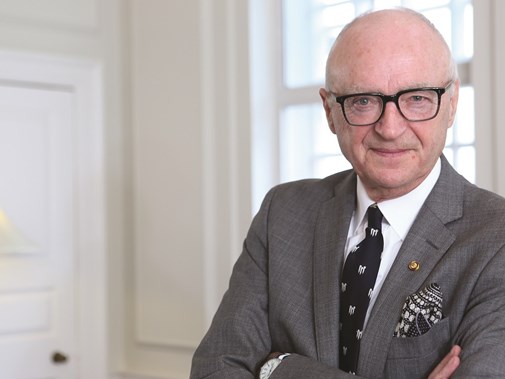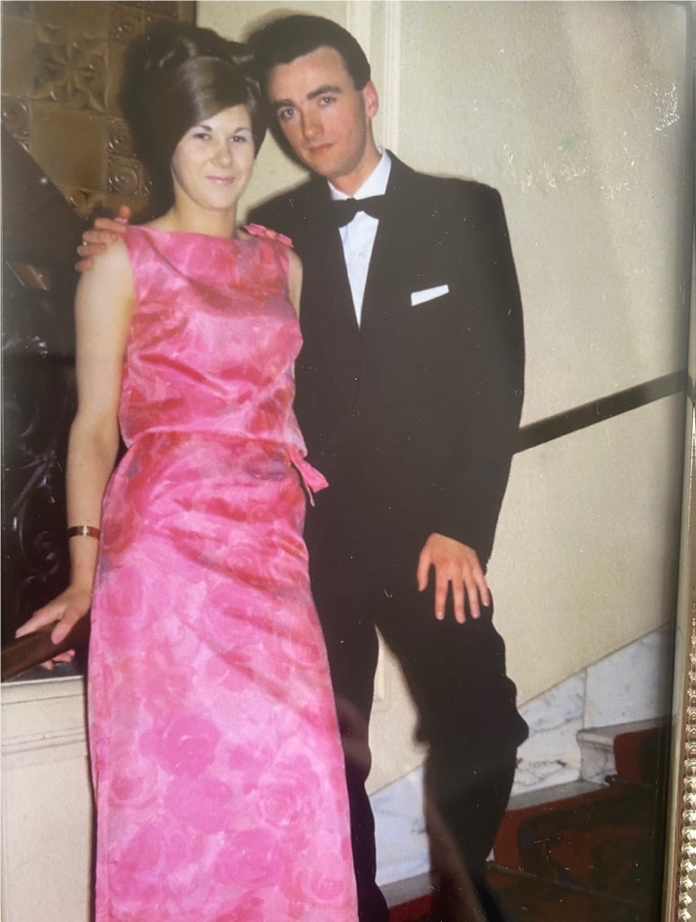Reflections on the first anniversary of my beloved wife’s death
Dorothy House’s Young People’s and Dementia Ambassador, Sir Al Aynsley Green, lost his beloved wife Rosemary just over a year ago.
Here, he reflects on the days leading up to her death and the dreaded first anniversary, and why more should be done to raise awareness about this difficult milestone, offering tips for the bereaved on how to manage the day.

Sir Al’s story
I knew it was coming. I couldn’t avoid or evade the swirling dark cloud looming on the horizon – the first anniversary of the death of my beloved, adored wife of 57 years, my beautiful Rosemary. I thought I was prepared for it but I wasn’t. As the day came closer I started to relive minute by minute the events leading up to her passing.
I remembered her contented, but severe dementia, not knowing who I was, but a little flicker of awareness as I came into the memory care home I’d been forced to admit her to. I saw her every morning for nine months; I held her tight, kissing her beloved lips and holding her hand. ‘C’mon’ she would say, leading me for a walk down her familiar corridor to sit quietly together in a two seater settee, my arm around her, telling her how very much I loved her. This seemed to give her comfort.
Compassionate care for Rosemary
Then one Sunday afternoon I was called and told she had fallen in the home with an obviously fractured hip. I rushed to the home and was told that the staff had called the emergency services who demanded an ambulance should be sent to admit her to hospital for her hip to be pinned under surgery; but this on a day with a six hour wait for an ambulance, two hours parked outside A&E and the likelihood of up to 12 hours on a trolley in a frightening, noisy corridor waiting for someone to assess her fitness for surgery. I knew that had she been judged to be fit she would postoperatively have needed a high dependency bed and a difficult, painful rehabilitation back to a life of severe dementia, this only delaying a further terminal decline.
I saw this to be unspeakable cruelty and I demanded to speak to the emergency service. I refused their call for an ambulance whilst trying to insist on palliative care to relieve her suffering. I was told in no uncertain terms that nobody had ever refused the call for surgical intervention, but I stood firm, asking to speak to the GP on call that day for the home.
He came immediately to assess the situation, examined her carefully and thankfully agreed with my stance, this being reinforced by the case records that documented Rosemary’s previously declared wish never to be admitted to hospital again alongside my lasting power of attorney for her. With immense compassion he gave her an immediate injection of morphine to remove her pain and distress and arranged for the community nurses to set up a drip in her arm, authorising a continuous infusion of diamorphine with the dose being adjusted to keep her comfortable.
She fell into a deep sleep, relieving me of the intense, unimaginable distress and anguish at seeing her undeserved suffering. The care home staff were wonderful. They set up a camp bed in her room and told me I could stay with her as much as I wanted to.
Together till the end
I remembered the next three days being a blur of intense sorrow as she slowly but certainly faded away. I stayed with her throughout, lying beside her and holding her close; I saw that her breathing was becoming slower and knew that she was dying. The care staff held our hands and wept with me when she finally, quietly and peacefully slipped away and stopped breathing.
As she did so I wondered out loud if angels were there to keep her safe in her journey into the dark land, for the first time in 57 years not being able to travel with her. Unbidden there came into my mind the need to access the wonderful aria from Handel’s oratorio ‘Jephtha’. The tenor soloist sings ‘Waft her angels through the skies above yon azure plain’, as the chamber orchestra hauntingly plays the heartfelt cadences that only Handel could write.
This utterly beautiful music gave me, and still gives me, so much solace, but I have no idea from where this need came. To the best of my knowledge despite both of us being enthusiastic fans of Handel, I had never studied or even listened to this music previously.

The first anniversary
At last it was the first anniversary of that dreadful day. The disconnection between my logical brain, knowing she was gone and never coming back, and my emotional brain in yearning for her was stark. I felt I just had to drive the hundred or more miles to the stunningly beautiful Devon churchyard in which her ashes had been laid to rest – the village church in which we had declared our love and our commitment to each other ‘till death us do part’ all those years ago. It was a glorious day – birds singing in the trees, warm sunlight on the headstone over her ashes. I found myself talking out loud to her, telling her how much I missed her and how much I still loved her. I even fleetingly wished my own ashes were with her now, but knowing that in due course they would be.
I relived each minute of that day up to the point at 7.15 in the evening when she had gone from my life, leaving me, our daughters and grandchildren distraught.
I found myself utterly exhausted and shattered during the next few days. The equilibrium I thought I was achieving before the anniversary was seriously undermined. Sorrow, sadness and tears returned in abundance alongside social withdrawal, loss of appetite and difficulty not only in falling asleep, but then repeatedly waking during the night. I searched fruitlessly for a sign of her presence and even considered finding a medium to try to communicate with her.
First Anniversary of Death Syndrome
I then discovered a wealth of websites addressing ‘First Anniversary of Death Syndrome’. The effects of the first anniversary I now know are well described and are exactly as I had experienced them. It would have been so helpful to have known them before it happened; I would have known I wasn’t going mad and it would have been a comfort to learn others had experienced the same effects.
Now, two months after the anniversary I’m slowly regaining my equilibrium but can’t deny that the few days before and after it were really tough to bear.
Tips for managing the first anniversary of a loved one’s death
So, what lessons can I identify to try to help others facing this milestone? Be aware of the likely impact of the first anniversary in re-awakening exceptionally painful memories and prepare for it by reading at the very least websites specialising in coping with first.
My reading tells me there is no one right way to grieve the first death anniversary of a loved one. I’m told that how you feel and what you do will depend on your relationship with them, how and why they died and how far you’ve come in the 365 days following their departure.
It’s recommended to:
- Take time off work to properly process your emotions
- Don’t be afraid to seek support from close friends and family, while recognising that this may cause tears and upset for them also.
- If you want to be by yourself, then this is also fine and normal.
- Plan a commemoration in whatever way you feel is appropriate and meaningful.
- Reflect on the last year. A full 12 months have passed since your loved one has died. What has your life been like during that time? What successes have there been in distracting yourself from your grief?
- What will be different in the year to come?
- Be kind to yourself by thinking through the need for self-compassion.
- Consider spiritual support if you are religious or feel exploring your spirituality could be a comfort.
- Stay as fit as you can, both physically and emotionally.
There can be no doubt of the existence of First Death Anniversary Syndrome. It behoves support organisations to alert grieving people of its likely occurrence and impact, and signpost them to key resources to emphasise there is no ‘correct’ way to experience it. I strongly recommend to prepare and plan for its occurrence.
Bereavement support
At Dorothy House, our Family Support Team provides support to our patients and their family members. We are here to help adults and children, both before and after bereavement. Our team of volunteer Bereavement Support Practitioners are trained to provide one-to-one emotional support for family members, carers and friends of anyone who has died in our care. If you or a family member requires support, don’t hesitate to contact us.
Our Spiritual Support Team provides holistic care for patients, their loved ones and carers, ranging from specialist medical and nursing support, to physiotherapy, occupational and complementary therapies, and psychosocial and spiritual support.
We also offer community support groups, including Writing Hour, Walking Through Grief and Teens Bereavement Support Group.
First anniversary bereavement support
Here are some useful websites with information about First Death Anniversary Syndrome and how to manage it:
- https://www.lullabytrust.org.uk/bereavement-support/ – bereavement support after the death of a baby or child
- https://gerardshouse.org/getting-through-the-first-anniversary-of-your-loved-ones-death/#:~:text=The%20first%20anniversary%20of%20the,past%20and%20qualities%20you%20treasured – bereavement support for grieving children, teens and families.
- https://www.sueryder.org/how-we-can-help/bereavement-information/support-for-yourself/death-anniversaries – palliative, neurological and bereavement support.
- https://eternallyloved.com/blog/after-the-death-of-a-loved-one-what-to-expect-on-the-anniversary-of-death/– memorial event planner
- https://www.funeralhelpcenter.com/coping-with-the-anniversary-of-a-loved-ones-death/– information and resources to help you cope with dying, death, funerals and grief
- Share this page:
- https://www.dorothyhouse.org.uk/?p=116252